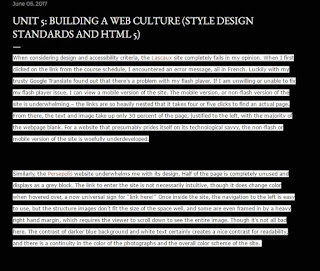Unit 14: Big Picture, User Participation Projects and Crowd-Sourcing (Genealogy)
This chapter from Rosenzweig is perhaps the most compelling yet, at least to me. I am looking to pursue a master's in library science with a focus on archiving, and probably digital archiving at that. The discussions about how perilous the integrity and accessibility of digital collections are in this week's chapter struck home.
It's startling to read that "the foremost American authority on the longevity of various media, the National Institute of Standards and Technology (NIST), still cannot give a precise timeline for the deterioration of many of the formats we currently rely on to store precious digital records." So much of the personal records we care about and rely on are stored in computers and on servers. If I lost my computer and online data storage, I would be losing a significant amount of important documents and personal photos. On the flip side, I wouldn't print out every document and photo either. It will be interesting to see where digital archiving goes as technology advances.
In terms of crowd sourcing in the area, I found a project started by the University of Maryland. Though not historically driven, the project is entirely crowd-sourced. Project Sidewalk is crowdsourcing a map of sidewalk impediments within the District of Columbia, which rates the walkability of areas for those that rely on assistive aids (wheelchair, walker, etc) to get around.
According to an article published in February 2017, "using Google Maps’ Street View, the tool drops participants into random locations throughout the city and prompts them to audit up to 1000 feet of that neighborhood. So far, the 475-person Project Sidewalk community has covered 463 miles of D.C. roads with 64,000 labels."
I have never participated in a crowd-sourced effort before, so the historical transcription project is especially interesting to me. I chose to transcribe museum labels through"Notes from Nature."
An update on my final project: I'm still continuing to gather information for my final project but progress has been slow this week. Work has been extremely busy and has taken up much of weeknight and weekend time. I have no concerns about completing the project on time, but am not at a good spot for a published update.
It's startling to read that "the foremost American authority on the longevity of various media, the National Institute of Standards and Technology (NIST), still cannot give a precise timeline for the deterioration of many of the formats we currently rely on to store precious digital records." So much of the personal records we care about and rely on are stored in computers and on servers. If I lost my computer and online data storage, I would be losing a significant amount of important documents and personal photos. On the flip side, I wouldn't print out every document and photo either. It will be interesting to see where digital archiving goes as technology advances.
In terms of crowd sourcing in the area, I found a project started by the University of Maryland. Though not historically driven, the project is entirely crowd-sourced. Project Sidewalk is crowdsourcing a map of sidewalk impediments within the District of Columbia, which rates the walkability of areas for those that rely on assistive aids (wheelchair, walker, etc) to get around.
According to an article published in February 2017, "using Google Maps’ Street View, the tool drops participants into random locations throughout the city and prompts them to audit up to 1000 feet of that neighborhood. So far, the 475-person Project Sidewalk community has covered 463 miles of D.C. roads with 64,000 labels."
I have never participated in a crowd-sourced effort before, so the historical transcription project is especially interesting to me. I chose to transcribe museum labels through"Notes from Nature."
An update on my final project: I'm still continuing to gather information for my final project but progress has been slow this week. Work has been extremely busy and has taken up much of weeknight and weekend time. I have no concerns about completing the project on time, but am not at a good spot for a published update.

RE archiving and storage, I had just read an article about storage and preservation of movies and how difficult it has become because of the massive size of digital video (as compared with old celluloid film, which has its own deterioration problems). Digital collections/archives--there are jobs out there in the field, especially if you have some software background.
ReplyDelete